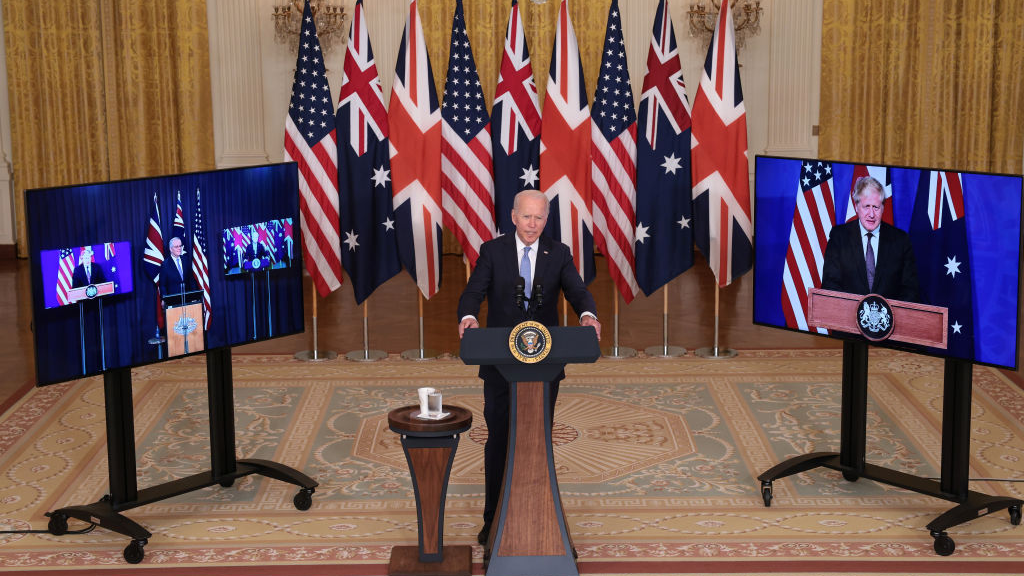
Rush Doshi, director for China at U.S. National Security Council, writes a Twitter post propagandizing the creation of the so-called AUKUS alliance, September 16, 2021. /@RushDoshi
Rush Doshi, director for China at U.S. National Security Council, writes a Twitter post propagandizing the creation of the so-called AUKUS alliance, September 16, 2021. /@RushDoshi
Editor's note: Hamzah Rifaat Hussain, a former visiting fellow at the Stimson Center in Washington and a former assistant researcher at the Islamabad Policy Research Institute (IPRI), is a TV anchor of Indus News in Pakistan. The article reflects the author's opinions and not necessarily the views of CGTN.
In a blow to established norms of non-proliferation, U.S. President Joe Biden announced a new working group with America's traditional allies – the United Kingdom and Australia – termed the "allies agreement" entailing the acquisition of nuclear-powered submarines for greater coordination in the Indo-Pacific region.
Given the importance placed on de-escalation and denuclearization globally, with disproportionate attention paid to Iran's nuclear program despite its recent compliance with the International Atomic Energy Agency (IAEA), this latest agreement presents a dim reality that is not conducive to unconditional demilitarization in the region but provocative and escalatory.
While all parties to the agreement initially refrained from propping up the "China threat" perception, according to two American officials, the contextual framework underpinning the agreement is yet another attempt to contain China. It encompasses the trio or "AUKUS," ensuring the ease of sharing information on subjects, such as artificial intelligence, long-range missiles and probable cyberattacks, which is complemented with the provision of nuclear-powered submarines. Deemed surprising by American officials, this foreign policy pivot from the Biden administration is considered an exception to America's own proclaimed standards, as it squarely targets Indo-Pacific defense priorities.
With Australia, it is perhaps even more surprising. Its geographical proximity to China has meant that Canberra's decision to abandon an initial $66 billion submarine deal with France for a nuclear one from the United States is paradoxical. Note that unlike the UK or the U.S., Australia has never found it necessary to acquire nuclear weapons given the lack of palpable security threats it has encountered in the region, which both President Joe Biden and Prime Minister Scott Morrison have admitted.
For the Biden administration officials pursuing Australia, it is worth remembering that in 2010, both Canberra and Washington, D.C. signed the "123 agreement," which involved a promise that enrichment or reprocessing nuclear material will not be pursued. However, under the new allies' agreement in 2021, nuclear submarines are now part and parcel of the equation, which essentially equates to the Indo-Pacific nuclearization.

U.S. President Joe Biden speaks during an event in the East Room of the White House in Washington, D.C., U.S., September 15, 2021. /Getty
U.S. President Joe Biden speaks during an event in the East Room of the White House in Washington, D.C., U.S., September 15, 2021. /Getty
This should definitely raise eyebrows, given that the technology involved as part of the agreement is also sensitive. By equipping countries such as Australia with powerful new equipment and tackling China as a top priority, parties to this agreement are sending a message to the international community that nuclear nonproliferation efforts will be compromised for narrow geopolitical security interests. Note that U.S. officials have revealed that there would be a push for more American submarines to make calls to Australian ports as a step toward coordinated navigation within the region.
This would once again expose nefarious foreign policy designs, which have been a trend of previous American administrations and have become more pronounced under the current one. This is despite the fact that lessons were supposed to be learned from previous foreign policy blunders in the region. For example, recent American proclivities for downplaying economic coordination and imploring states in South East Asia to adopt a confrontational approach toward China were already shunned in a neighborhood where non-alignment reigns supreme.
Yet, now the focus shifts toward roping in Australia, with the U.S. and the UK having an already established strategic partnership on technology sharing and nuclear-powered submarines prior to taking Canberra on board.
Either way, such moves will not be conducive to peace, given that American foreign policy on warmongering and shady defense agreements continue to face a credibility crisis. Forging partnerships that take aim at China will only reinforce the narrative that America is interested in power play instead of cooperation.
This also comes as repeated emphasis is placed on how an unconditional U.S.-China relationship is central to global peace, but it has not prevented the Biden administration from pursuing alliances at containment.
The latest decision to arm allies with nuclear submarines, which coincides with admissions from U.S. officials that Biden's pivot is once again toward China, demonstrates that lessons have not been learned.
(If you want to contribute and have specific expertise, please contact us at opinions@cgtn.com.)

